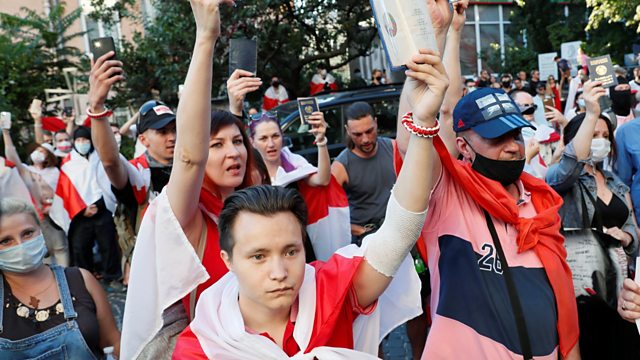Silencing dissidents
Are changing politics and new technologies making it harder to be a dissident?
A year on from the disputed election in Belarus, the country’s president has denied claims his security services were involved in the death of dissident Vitaly Shishov, who was found hanged in neighbouring Ukraine last week. The death follows EU accusations that Minsk effectively “hijacked” a plane en route to Lithuania earlier this year, forcing it to land in Belarus where a journalist on board who was a critic of the president was arrested. Technology allows many dissidents to continue impacting events whether they live at home or abroad. But reports suggest spyware developed in Israel and sold to multiple governments may have been used to target rights activists, journalists and lawyers. The company behind the software denies any wrongdoing and says it’s intended for use against criminals and terrorists. But with surveillance systems proliferating and activists increasingly voicing fears over their safety, is the role that dissidents play under threat?
Ritula Shah is joined by a panel of expert guests. Producers: Paul Schuster and Zak Brophy.
Last on
More episodes
Previous
Contributors
Ishan Sharma - Scoville Fellow at the Federation of American Scientists where he specialises in digital authoritarianism
Nigel Inkster - Former director of operations and intelligence for the British intelligence service MI6, now at the International Institute for Strategic Studies (IISS)
Dr Sangeeta Mahapatra - Visiting Fellow at the German Institute for Global and Area Studies (GIGA)
Photo
Belarusians who fled their home country for Ukraine, as well as Ukrainian activists, at a rally near the embassy of Belarus in central Kyiv, August 8, 2021. Credit: REUTERS/Gleb Garanich.
Broadcasts
- Fri 13 Aug 2021 09:06GMT����ý World Service
- Fri 13 Aug 2021 23:06GMT����ý World Service
- Sat 14 Aug 2021 03:06GMT����ý World Service
The Real Story Podcast
Subscribe via your favourite podcast app...
Podcast
-
![]()
The Real Story
Global experts and decision makers discuss, debate and analyse a key news story.


